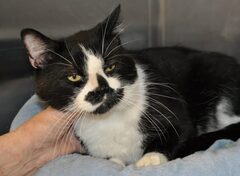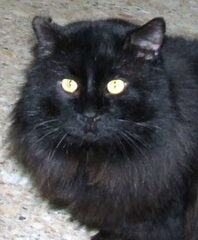 You may notice that some of the cats available for adoption have a small green heart that signifies they are special needs. They may be identified as special needs for various reasons, but one of the most common reasons is because they tested positive for FIV. Here are some facts about FIV:
You may notice that some of the cats available for adoption have a small green heart that signifies they are special needs. They may be identified as special needs for various reasons, but one of the most common reasons is because they tested positive for FIV. Here are some facts about FIV:
FIV Facts
1. The Feline Immuno-deficiency Virus is a slow virus that affects a cat's immune system over a period of years.
2. FIV is a cat-only disease and cannot be spread to humans or other non-felines.
3. FIV cats most often live long, healthy, and relatively normal lives with no symptoms at all.
4. FIV is not easily passed between cats. It cannot be spread casually - like in litter boxes, water and food bowls, or when snuggling and playing. It is rarely spread from a mother to her kittens.
5. The virus can be spread through blood transfusions, badly infected gums, or serious, penetrating bite wounds. (Bite wounds of this kind are extremely rare, except in free-roaming, unneutered tomcats.)
6. A neutered cat, in a home, is extremely unlikely to infect other cats, if properly introduced.
7. Many vets are not educated about FIV since the virus was only discovered 15 years ago.
8. FIV-positive cats should be kept as healthy as possible. Keep them indoors and free from stress, feed them a high-quality diet, keep and treat any secondary problems as soon as they arise.
 Many FIV cats, such as Chester (pictured above) and Arnie (pictured on the right) have been waiting a long time to be adopted, because they tested positive for
FIV. And yet in some cases they may not even have FIV. If they were
ever vaccinated against it, they will show as positive for the virus for the
rest of their lives. And even if they do have FIV, they may go their entire
life without ever showing symptoms. FIV positive cats can live long, healthy,
happy lives. So please, if you're considering adopting a cat, consider one of
these very worthy FIV cats.
Many FIV cats, such as Chester (pictured above) and Arnie (pictured on the right) have been waiting a long time to be adopted, because they tested positive for
FIV. And yet in some cases they may not even have FIV. If they were
ever vaccinated against it, they will show as positive for the virus for the
rest of their lives. And even if they do have FIV, they may go their entire
life without ever showing symptoms. FIV positive cats can live long, healthy,
happy lives. So please, if you're considering adopting a cat, consider one of
these very worthy FIV cats.


